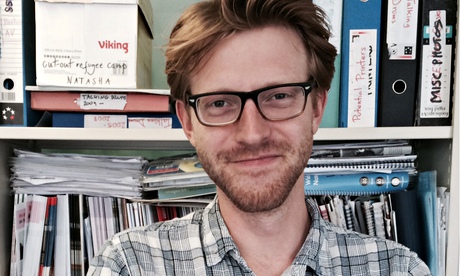Médecins Sans Frontières staff member Nick Owen explains why he agreed to take part in trials to find a safe and effective Ebola vaccine

Last night, I was frozen in place by a Facebook post.
On first appearance, it doesn’t look like much: a picture of a dirt-strewn clearing in a forest. Saplings sprout from the rutted ground and a lone wooden cross sits in the centre of the photograph.
It’s not until you read the caption that you truly understand what you are looking at.

Javid Abdelmoneim, reporter at The Cure, al-Jazeera, 8 October, 12.04pm
A clearing in the forest and an unmarked grave. I went to visit Alpha’s grave today. He died alone, frightened, in pain, and bleeding from his eyes. An Ebola victim. An Ebola orphan.
One year old. His parents are somewhere in this clearing too. I’ll remember him for ever and I cried for him. Please all of you save a thought for him today. Please.
The picture is of a mass grave in Sierra Leone, dug for people who have succumbed to Ebola. It’s stories like this that made me want to take part in the first-ever clinical trial for an Ebola vaccine, which is currently under way at Oxford University’s Jenner Institute.
People have said that I must be brave and/or stupid to want to take part in such an experiment, but I don’t quite see the issue. The trial is to test the safety of the vaccine and whether it can produce an immune response, charting the possible side effects and to pinpoint the dosage needed when it is eventually used in the field.
I was given the vaccine a week ago. So far, I feel absolutely fine. To be honest, I’ve had flu vaccines that have made me feel worse.
A couple of weeks before I was given the vaccine, I had a screening visit with a doctor taking part in the trial. This was to make sure I was fit to take part, and included blood tests and a review of my medical history. I passed.
A couple of weeks later, I was back at the university’s centre for clinical vaccinology and tropical medicine, where I was seen by the nurses and given a quick check-up. My temperature and blood pressure were taken — all fine.
Then another set of blood samples were taken to establish a baseline for which all of my future blood tests could be measured against: over the next six months I have to return seven times to have my blood tested to see how I’m reacting to the vaccine.
The vaccine I’ve been given is called ChAd3, which uses a single benign Ebola virus protein (approximately one-seventh the size of the whole virus) to generate an immune response. It’s carried into my body by a “vector,” in this case a chimpanzee adenovirus – or a common cold. I’m given a virus as it allows the Ebola protein to get inside cells, producing a particular type of immunity.
It is, specifically, a chimp virus. That’s because we are often immune to the average common cold, meaning the vaccine might not have a chance to work. I’m essentially tricking my immune system into thinking it has an infection.
The nurse brought the vaccine to the appointment room from the freezer, where it was stored at minus 80C. She thawed the vaccine in her hands, drew it into a syringe and, within seconds, it was making its way into my bloodstream from my left upper arm. It was an odd feeling to think that I now had a bit of one of the world’s deadliest diseases coursing through my body.
For the first 28 days, I have to keep an electronic diary, recording my temperature and every medical complaint I have, whether it’s a sneezing fit or breaking my ankle – which, thankfully, hasn’t happened.
The good news: apart from having slight flu-like symptoms and a mildly sore arm the day after the vaccine, I’ve felt completely fine.
It’s a small price to pay and can’t be compared to the sacrifices that healthcare workers in west Africa are making at the moment. Doctors, nurses and other health staff are risking their lives, and many have died attempting to bring some comfort to people infected with this horrendous virus.
Many healthcare workers, like my friend Javid [a doctor who also reports for Al Jazeera] – who posted the picture from Sierra Leone while working for MSF – have felt absolutely helpless responding to this outbreak. There is no cure for the disease, and they often feel there is little they can offer patients.
I hope that by taking part in this trial I can play a very — and I emphasise the word very — small part in helping to prevent outbreaks of this magnitude from happening again.
Nick Owen will be a part of the trial for another five months, with three more blood tests to undergo before establishing if his body has reacted well to the vaccine. Originally posted at mashable.com
